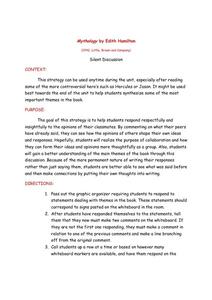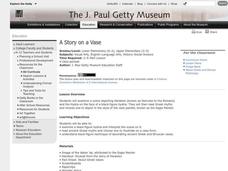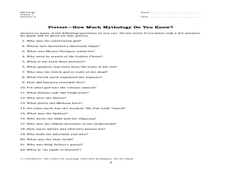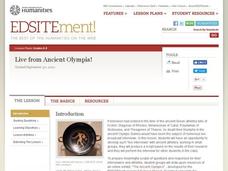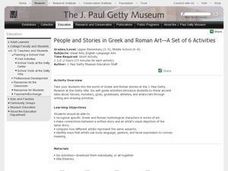Curated OER
Geeky Greeks and Robust Romans: A Look at How a Few Folks a Few Thousand Years Ago Began a Few Trends
Have a blast comparing and contrasting ancient Greek and Roman cultures with this entertaining and educational powerpoint, which is as well-organized as it is thorough. Students will find the differences between the Greeks and Romans...
Curated OER
English Words from Greek and Roman Names of Gods
Hydra/hygiene, Muse/music. Many English words are built on roots derived from the names of Greek and Roman gods. After examining a list of Greek and Roman gods and the meaning of their names, class members find the root in a list...
Curated OER
Mythology by Edith Hamilton: Silent Discussion
Get everyone up and participating! High schoolers reading Mythology, by Edith Hamilton, complete a graphic organizer independently, and then record one of their thoughts on the white board for a silent discussion. Decide how you're going...
Curated OER
Mythological Word Origins
Review myths and the characters therein, connecting them to vocabulary words in the English language today. Begin by searching online for myths and character names. With at least ten names that are familiar English words, students use...
Curated OER
Mythological Word Origins
No wonder the ship was called the Titanic. An investigation of Norse, Roman, and Greek Mythology provides insight into mythological characters and corresponding words in the English language. A close look at roots, prefixes, and suffixes...
Curated OER
Greek mythology (characteristics and features)
Students recognize the features and characteristics of myths, the role myths played in Greek culture, and choose a writing project. In this Greek mythology lesson, students are introduced to Greek mythology and work in cooperative...
Curated OER
Greek and Roman Myths in Art-A Set of 7 Activities
Young scholars paricipate in seven activities to investigate ancient stories about heroes, monsters, gods, and goddesses.
Curated OER
A Story on a Vase
Learners associate a hydria with Greek myths. In this Greek art and mythology lesson plan, students examine a scene on a hydria, then choose a Greek myth to illustrate on their own painting.
Curated OER
A Story on a Vase
Students analyze a scene depicting Herakles and the Hydra. In this Greek art lesson, students read Greek myths and choose one scene from a myth to illustrate. Students use tempera paint and a scratch technique using a wooden...
Curated OER
Mythology - What Is It?
Students explore Greek mythology. In this mythology lesson, students discuss and define mythology. Students view pictures and associate them with the correct Greek myth. Students answer trivia questions about their knowledge for mythology.
Curated OER
Live from Ancient Olympia!
Students study online resources to examine the ancient Olympic Games and athletes. They investigate the qualities of ancient Olympic athletes and role interviews with the athletes.
Curated OER
Putting a Spin on Current Events
Students discover propaganda. In this Greek mythology lesson, students discuss meanings of ancient art work with their class. Students investigate the dishonesty behind propaganda.
Curated OER
Mythological Soaps
Students examine the gods and goddesses of Greek and Roman mythology. In groups, they use this information to participate in skits as they role-play the gods and goddesses. To end the lesson, they draw their own caricature of their...
Curated OER
The Origin of Words
Help your class identify known words in a given passage. They will read a passage from the Greeks and Romans and identify five words still in use today. Then define four of the five words.
Curated OER
Going Greek
Third graders learn about the life of a young boy in Greece and all about his cultural heritage. Pupils gather information about the history, culture, and the many influences the ancient Greeks had on modern day society. Terrific video...
Curated OER
Greek Gods Who Are They?
Sixth graders research a Greek God with a partner and prepare a presentation for the class. They use the computer and Internet, as a motivator for a Social Studies unit and explore the mythology, legends, values and beliefs of a people.
Curated OER
Ocean Mythology
Students examine Greek and Roman mythology concerning the oceans and humankind's relationship with them, and create presentations to share with classmates.
Curated OER
Sophocles' Antigone: Ancient Greek Theatre, Live from Antiquity
Learners analyze Antigone and its universal issues as well as explore ancient Greece. For this Antigone and Ancient Greece lesson, students read and complete activities for Sophocles' Antigone. Learners reconstruct the experience of a...
Curated OER
J. Paul Getty Museum
Young scholars read mythological Greek and Roman stories. In this mythological lesson plan students read mythological stories about Greek and Roman times. As they read, they compare the written story to the visual art of the story.
Curated OER
Introduction to Greek Theatre
Students create a tableau for a Greek myth. In this introduction to Greek theatre instructional activity, students discuss the history of Greek theatre and tableau and complete a handout. Students work in groups to choose a...
Curated OER
Referencing the Classical Past
Students discuss the sculptural group of Three Goddessesby Joseph Nollekens in a study of the classical past. In this Classical history lesson, students describe the three figures in the painting and read an excerpt for the story the art...
Curated OER
Ancient World
Sixth graders play a powerpoint jeopardy game. This can be used as a test or as a way to review information. This is a culminating test for our unit on Ancient Worlds. The jeopardy game is based on goals in math, language arts, and...
Curated OER
Life in Ancient Greece
Explore ancient history and everyday life of ancient Greece. Learners will use Internet resources to research the culture of ancient Greece in order to complete worksheets regarding the topic. Topics include home, clothing, marriage,...
Curated OER
Mythology and Ancient Civilizations
Third graders examine ancient world civilizations and the mythologies they created to explain natural phenomena, as well as the writers and poets who wrote about the mythologies.




